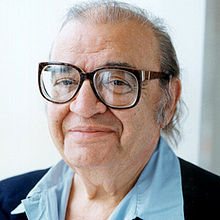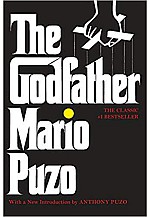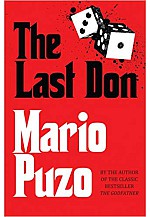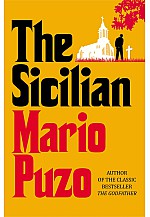
Mario Puzo
Mario Gianluigi Puzo (October 15, 1920 – July 2, 1999) was an American author, screenwriter and journalist. He is known for his crime novels about the Italian-American mafia, most notably The Godfather (1969), which he later co-adapted into a three-part film saga directed by Francis Ford Coppola. He received the Academy Award for Best Adapted Screenplay for the first film in 1972 and Part II in 1974. Puzo also wrote the original screenplay for the 1978 Superman film. His final novel, The Family, was released posthumously in 2001.
In 1950, his first short story, "The Last Christmas," was published in American Vanguard. After the war, he wrote his first book, The Dark Arena, which was published in 1955.
During the 1950s and the early 1960s, Puzo worked as a writer/editor for publisher Martin Goodman's Magazine Management Company. Puzo, along with other writers like Bruce Jay Friedman, worked for the company line of men's magazines, pulp titles like Male, True Action, and Swank. Under the pseudonym Mario Cleri, Puzo wrote World War II adventure features for True Action. Puzo's most famous work, The Godfather (1969), was encouraged by a suggestion of the publisher of his The Fortunate Pilgrim (1965), who thought that if there had been more Mafia in that book, it would have been more successful. A story outline was prepared and presented to the publisher, who rejected it. After several publishers were approached, Putnam editors met with him without having read the outline. He told them a few stories, and the project was approved. With the advance, he got on with the project.[citation needed] He had heard anecdotes about Mafia organizations during his time in pulp journalism.
He said in an interview with Larry King that the critical reception of his previous two books, without the monetary success to follow, made the issue all the more important in the next work to support his five children on a government clerk's salary. He was looking to write something that would appeal to the masses. He found his audience with the novel, which became the top bestseller for months on the New York Times Best Seller List. The book was later developed into the film The Godfather, directed by Francis Ford Coppola. The film received three awards of the eleven Oscar category nominations, including Puzo's Oscar for Best Adapted Screenplay. Coppola and Puzo then collaborated on sequels to the original film, The Godfather Part II and The Godfather Part III.
Puzo wrote the first draft of the script for the 1974 disaster film Earthquake, but he was unable to continue working on it because of his commitment to The Godfather Part II. Puzo also wrote the original screenplay for Richard Donner's Superman, which then also included the plot for Superman II, as they were originally written as one film. He also collaborated on the stories for the 1982 film A Time to Die and the 1984 Francis Ford Coppola film The Cotton Club.
In 1991, Puzo's speculative fiction The Fourth K was published; it hypothesizes a member of the Kennedy family who becomes President of the United States early in the 2000s. Puzo never saw the publication of his penultimate book, Omertà, but the manuscript was finished before his death, as was the manuscript for The Family. However, in a review originally published in the San Francisco Chronicle, Jules Siegel, who had worked closely with Puzo at Magazine Management Company, speculated that Omertà may have been completed by "some talentless hack." Siegel also acknowledged the temptation to "rationalize avoiding what is probably the correct analysis – that [Puzo] wrote it and it is terrible."





